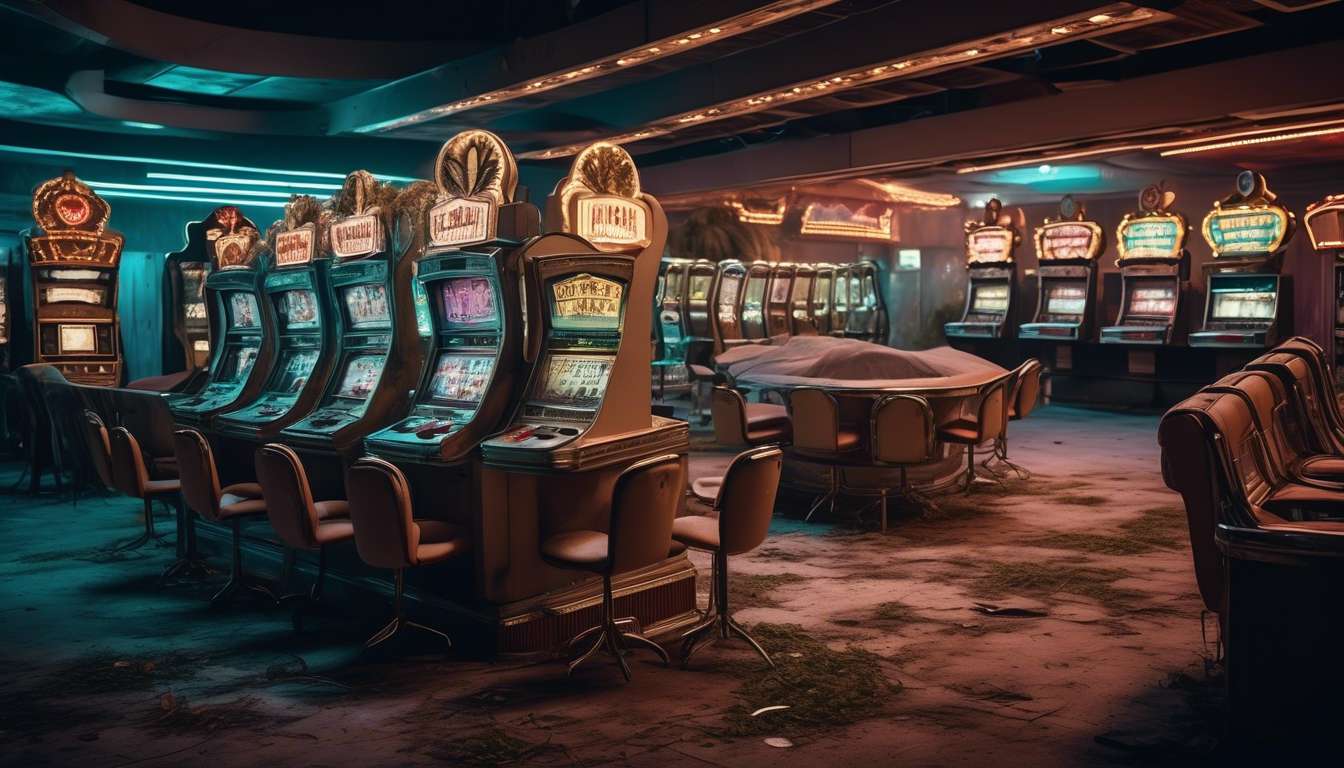As we delve into the unfolding narrative of casino closures across the United States, we find ourselves at a crossroads between tradition and transformation. Together, we’ve witnessed the bright lights of our local casinos dimming, a once vibrant hub of entertainment and economy now facing unprecedented challenges.
It’s not just about the loss of a place to gamble or catch a show; it’s about the ripple effects these closures have on our communities, including:
- Job losses
- Diminished tourism
We share a collective history with these establishments, where many of us have celebrated special occasions and enjoyed evenings out.
As we explore the reasons behind these closures, we consider several factors:
- Economic shifts
- Regulatory changes
- The rise of online gaming
By reflecting on these reasons, we aim to understand not only what has been lost, but also what new opportunities may arise in this evolving landscape.
Impact of Casino Closures on Communities
The sudden closure of casinos can significantly disrupt local economies and community livelihoods. We rely on these establishments not just for entertainment but as vital economic engines.
When casino closures hit, the ripple effects are felt throughout our towns:
- Local businesses that thrive on foot traffic from casinos suddenly face dwindling customers.
- Restaurants, hotels, and shops that once buzzed with activity struggle to stay afloat.
Our sense of community, often centered around these bustling hubs, begins to feel fragmented.
As we grapple with the economic impact, many of us turn to online gaming as an alternative. While it offers a convenient escape, online gaming can’t replace the social interactions and sense of belonging that physical casinos provide.
We miss the camaraderie of a night out and the thrill of a shared experience. It’s a reminder that our communities are more than just the sum of our economic activities; they’re about the connections we forge and the spaces we share.
Job Losses and Economic Fallout
We’re witnessing firsthand the stark reality of job losses as thousands of workers suddenly find themselves unemployed. Casino closures have left a significant economic impact, creating a ripple effect in our communities.
It’s not just about the loss of income for these individuals; it’s about the sense of belonging that’s been disrupted. We all understand the importance of community and shared experiences, and these closures have taken that away from many.
As we navigate this challenging time, we must acknowledge the shift towards online gaming. While it offers a digital alternative, it doesn’t replace the jobs or replicate the vibrant atmosphere of a bustling casino floor.
The economic impact is profound, affecting not only employees but also local businesses that relied on casino traffic.
Together, we need to explore ways to support those affected and adapt to the changing landscape. Let’s stand united, ensuring our communities remain resilient and find new paths to economic recovery.
Decline in Local Tourism
The decline in local tourism is evident as fewer visitors are drawn to areas once bustling with casino-driven attractions. Our towns have transformed from lively hubs to quieter shadows of their former selves. Casino closures have significantly reduced foot traffic, impacting not only the casinos themselves but also local businesses like restaurants, hotels, and shops.
Each closure brings an undeniable economic impact that ripples through our community, affecting our sense of unity and shared prosperity.
We understand that online gaming is becoming more popular, offering convenience that traditional casinos can’t match. However, it’s important to recognize what we’re losing:
- The vibrant social scenes
- Unique experiences that physical casinos provided
Our communities thrived on the energy and excitement that visitors brought. As we navigate this shift, we must find ways to reinvent our local attractions and preserve the spirit of camaraderie that casinos once fueled in our towns.
Historical Significance of Casinos
Throughout history, casinos have been integral to the cultural and economic fabric of many American communities, offering more than just entertainment and gaming.
Casinos have brought people together, creating vibrant social hubs where memories are made and connections are forged. Celebrating milestones with friends and family in these lively spaces, casinos have also played a crucial role in supporting local economies through:
- Job creation
- Tourism
However, the recent wave of casino closures has us reflecting on their historical significance.
These closures aren’t just about losing places of entertainment; they signify a shift in our community dynamics and economic landscapes. The rise of online gaming has contributed to this change, drawing players away from traditional venues.
While technology provides new opportunities, it also challenges the sense of belonging we’ve long associated with physical casinos.
As we navigate this transition, we recognize the need to preserve the community spirit that casinos have historically fostered.
Economic Factors Behind Closures
In recent years, we’ve witnessed a significant decline in casino revenues due to shifting consumer preferences and increased competition from online platforms. The rise of online gaming has offered a convenient alternative, drawing players away from traditional casinos.
This shift has led to numerous casino closures, impacting not just the businesses themselves but also the communities around them.
The economic impact is far-reaching. Local economies, once thriving due to the influx of tourists and employment opportunities that casinos provided, now face challenges. Job losses and reduced tourism mean that our communities must pivot and find new ways to sustain growth and maintain that sense of belonging we all cherish.
As we navigate these changes together, it’s clear that we need to embrace innovation. By doing so, we can ensure that our communities remain vibrant and welcoming in the face of the evolving gaming landscape.
Changing Regulatory Landscape
In recent years, we’ve seen a marked shift in the regulatory landscape as state governments reevaluate and update their gambling laws to keep pace with technological advancements and changing consumer habits. This transformation has been a collective journey, bringing us all together in navigating these new waters.
As regulations evolve, the consequences are felt across our communities, especially with the rise in casino closures. These closures are more than just shuttered doors; they carry an economic impact that ripples through local economies, affecting jobs and revenue streams.
We’re witnessing a delicate balance as lawmakers strive to:
- Protect traditional casinos
- Embrace the potential of online gaming
This shift requires us to adapt, fostering a sense of unity in our shared goal of economic resilience.
As we move forward, our collective voice plays a crucial role in shaping policies that will determine the future of gambling in our states. Together, we can navigate this changing landscape, ensuring that our communities thrive.
Influence of Online Gaming
As digital platforms reshape the gambling industry, we’re witnessing a profound shift in how people engage with gaming experiences. Online gaming offers convenience and accessibility, allowing us to partake in thrilling games from the comfort of our homes.
This shift has contributed significantly to casino closures, as traditional venues struggle to compete with the digital allure. The economic impact is palpable; local economies relying on casinos for jobs and tourism are feeling the strain.
With our smartphones and computers, we’re part of a community that transcends geographical boundaries. Online gaming platforms foster a sense of belonging, offering interactive experiences and social connections that brick-and-mortar casinos find challenging to replicate.
While some may lament the loss of in-person interactions, others embrace the new social dynamics that online gaming provides.
As we continue to adapt to this evolving landscape, it’s clear that our collective preference for digital experiences is shaping the future of the gambling industry, leaving a lasting economic impact.
Potential Opportunities Amidst Closures
Amidst the closures, we can explore new opportunities to innovate and diversify the services offered by traditional casinos. The economic impact of casino closures is undeniable, but it’s also a chance for us to rethink and reshape our approach.
By embracing online gaming, we can bridge the gap between physical and digital experiences, offering our community the chance to connect and play in new, exciting ways.
Online gaming isn’t just a temporary fix; it’s a strategic expansion. We can create engaging virtual environments that offer the thrill of classic casino games, ensuring no one feels left behind. By integrating:
- Loyalty programs
- Personalized experiences
We foster a sense of belonging and keep our community engaged.
Additionally, we can reimagine our physical spaces, focusing on entertainment and dining options that complement the online experience. This dual approach can:
- Mitigate the economic impact of closures
- Pave the way for a more resilient, inclusive gaming industry that welcomes everyone.
Conclusion
Repercussions of Casino Closures in the U.S.
The closure of casinos in the U.S. has had significant effects on various aspects:
-
Communities: Local communities that once thrived on the business brought in by casinos are facing economic downturns. These establishments often contribute to local economies through taxes and community projects.
-
Job Markets: The job market has been severely impacted with the loss of employment for thousands of workers who relied on casinos for their livelihoods. This includes not only direct employees but also those in supporting industries such as hospitality and retail.
-
Tourism: Casinos have traditionally been a major draw for tourism. Their closures can lead to a decline in tourist numbers, affecting local businesses that rely on tourist spending.
Economic Factors Behind the Closures
The reasons behind these closures are multifaceted:
-
Changing Regulations: Stricter regulations and policies have made it difficult for some casinos to operate profitably.
-
Rise of Online Gaming: With the increasing popularity of online gaming platforms, physical casinos face stiff competition, affecting their revenue streams.
Opportunities Amidst Challenges
Despite these challenges, there are potential opportunities emerging:
-
Shift in the Traditional Casino Landscape: There is a possibility for innovation and adaptation, with casinos potentially exploring new business models or diversifying their offerings.
-
New Possibilities: Stakeholders should remain vigilant for opportunities to create hybrid models that combine physical and digital gaming experiences.
In summary, while the closure of casinos presents challenges, it also signals a shift in the industry that may lead to new prospects and innovations.

